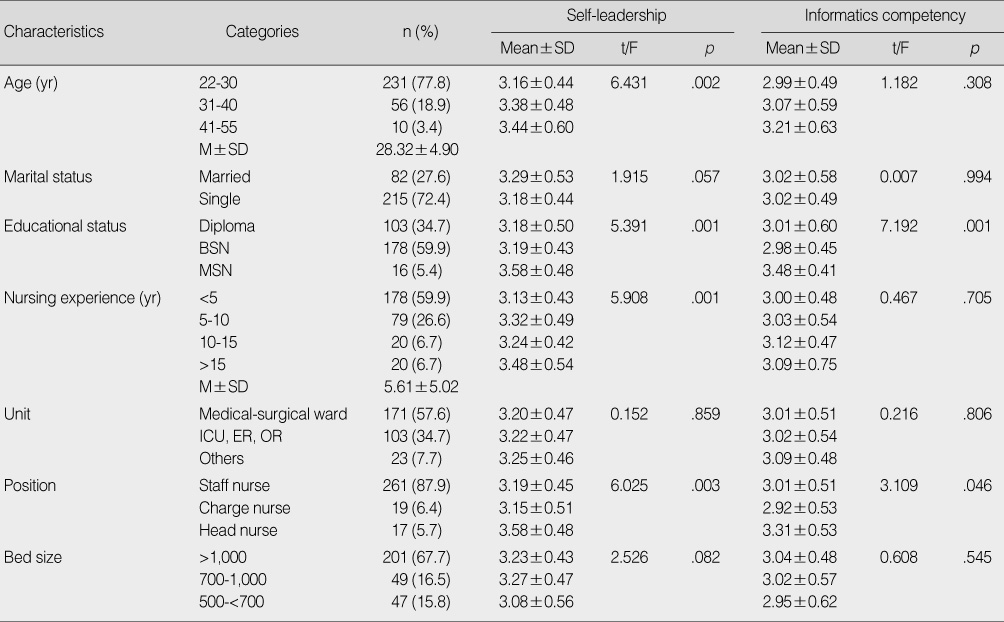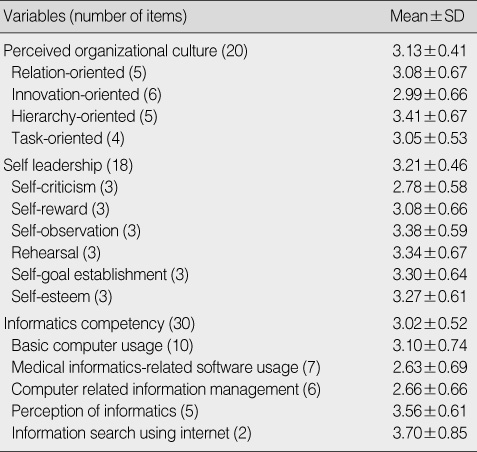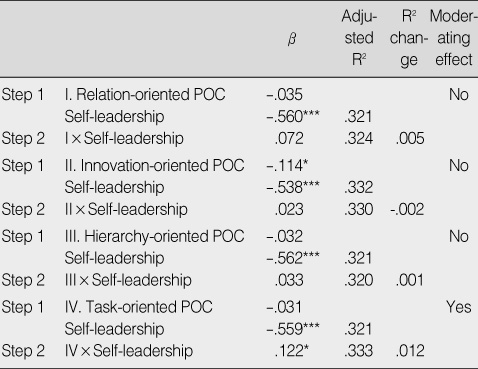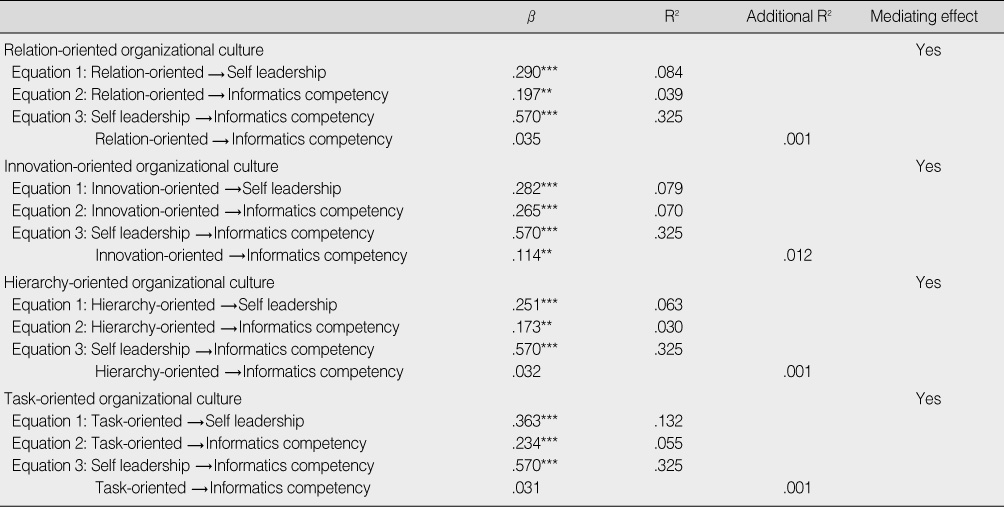Articles
- Page Path
- HOME > J Korean Acad Nurs > Volume 39(5); 2009 > Article
-
Original Article
- Role of Self-Leadership in the Relationship between Organizational Culture and Informatics Competency
- Myoung Soo Kim
-
Journal of Korean Academy of Nursing 2009;39(5):731-740.
DOI: https://doi.org/10.4040/jkan.2009.39.5.731
Published online: October 31, 2009
Assistant Professor, Department of Nursing, Ulsan College, Ulsan, Korea.
- Address reprint requests to: Kim, Myoung Soo. Department of Nursing, Ulsan College, 101 Bongsu-ro, Dong-gu, Ulsan 682-715, Korea. Tel: 82-52-230-0737, Fax: 82-52-230-0730, kanosa@hanmail.net
Copyright © 2009 Korean Society of Nursing Science
Figure & Data
REFERENCES
Citations

- Competency in Nursing Informatics of Health Educators
YoungRan Chin, Hyun Kim
The Open Public Health Journal.2022;[Epub] CrossRef - A study on nursing informatics competence of clinical nurses: Applying focus group interview
Seon Mi Jang, Jeongeun Kim
The Journal of Korean Academic Society of Nursing Education.2020; 26(3): 299. CrossRef - Relationships among demands at work, aggression, and verbal abuse among registered nurses in South Korea
Hyoung Eun Chang, Mi Youn Park, Haena Jang, Shinae Ahn, Hyo-Jeong Yoon
Nursing Outlook.2019; 67(5): 567. CrossRef - A Predictive Model on Patient-Centered Care of Hospital Nurses in Korea
Hyun Jeong, Myonghwa Park
Journal of Korean Academy of Nursing.2019; 49(2): 191. CrossRef - Mediating Effects of Self-leadership in the Relationship between Public Health Nurses' Organizational Culture and Their Job Performance
Nam Hee Park, Kyung Jo Lee, Sang Ju Lee
Journal of Korean Academy of Community Health Nursing.2017; 28(1): 23. CrossRef - Relationship among Types of Nursing Organizational Culture, Self-leadership and Burnout as Perceived by Perioperative Nurses
Minkyung Im, Young-Hee Sung, Junghee Jung
Journal of Korean Academy of Nursing Administration.2017; 23(2): 170. CrossRef - Factors Influencing Intention to Use Smart-based Continuing Nurse Education*
Myoung Soo Kim, Sungmin Kim, Hyun Kyeong Jung, Myoung Hee Kim
Journal of Korean Academy of Fundamentals of Nursing.2016; 23(1): 51. CrossRef - The Influence of Nursing Informatics Competency on Job-Satisfaction and Nursing Performance
Jeon-Ma Lee, In-Sun Gang, Su-Jeong Yu
The Korean Journal of Health Service Management.2015; 9(1): 109. CrossRef - Development and Validity of Workplace Bullying in Nursing-Type Inventory (WPBN-TI)
Younju Lee, Mihyoung Lee
Journal of Korean Academy of Nursing.2014; 44(2): 209. CrossRef - Job Competencies and Educational Needs Perceived by New Community Health Practitioners
Hyun Kyung Kim, Young Eun, Kyung Ja June, Ae Young So, Hee Gerl Kim, Mi Ran Eom, Yeon Yi Song, Eun Suk Choi, Ji Yeon Park, Hyoung Suk Kim
Journal of Korean Academy of Community Health Nursing.2014; 25(2): 85. CrossRef - Nursing Informatics Competencies of Public Health Nurses in Chungcheongnam-do
Hyun Kim, Miyoung Kim
Journal of Korean Academy of Community Health Nursing.2013; 24(1): 20. CrossRef - A Review of Research on Self-leadership in Nurses'
Hyo Jin Won, Sung Hyun Cho
Journal of Korean Academy of Nursing Administration.2013; 19(3): 382. CrossRef - Impact of Critical Thinking Disposition, General Self-Efficacy, and Leadership on Clinical Competence in Nursing Students
Jee Won Park, Chun-Ja Kim, Yong Soon Kim, Moon Sook Yoo, Hyera Yoo, Sun-Mi Chae, Jeong-Ah Ahn
Korean Journal of Medical Education.2012; 24(3): 223. CrossRef - Nursing Core Competencies Needed in the Fields of Nursing Practice for Graduates in Nursing
Sun-kyoung Lee, Sun Nam Park, Seok Hee Jeong
Journal of Korean Academy of Nursing Administration.2012; 18(4): 460. CrossRef - The Changes of Self-esteem and Leadership during Two Years in Nursing Students
Sei-Young Oh, Sun-Nam Park
The Journal of Korean Academic Society of Nursing Education.2010; 16(2): 186. CrossRef - Canonical Correlation between Organizational Culture and Informatics Competency
Myoung Soo Kim
Journal of Korean Academy of Nursing Administration.2010; 16(2): 172. CrossRef
Self-Leadership and Informatics Competency according to Participants' Characteristics (N=297)
BSN=bachelor of science in nursing; MSN=master of science in nursing; ICU=intensive care unit; ER=emergency room; OR=operating room.
Perceived Organizational Culture, Self-Leadership, Informatics Competency of Participants (N=297)
Pearson Correlation Coefficients for Perceived Organizational Culture, Self-Leadership and Informatics Competency (N=297)
POC=perceived organizational culture.
Moderating Effect of Self-Leadership on the Relationship between Perceived Organizational Culture and Informatics Competency (N=297)
POC=perceived organizational culture.
*p<.05; ***p<.001.
Mediating Effects of Self-Leadership in the Relationship between Organizational Culture and Informatics Competency (N=297)
**p<.01; ***p<.001.
BSN=bachelor of science in nursing; MSN=master of science in nursing; ICU=intensive care unit; ER=emergency room; OR=operating room.
POC=perceived organizational culture.
POC=perceived organizational culture. *
**
 KSNS
KSNS
 E-SUBMISSION
E-SUBMISSION





 Cite
Cite

